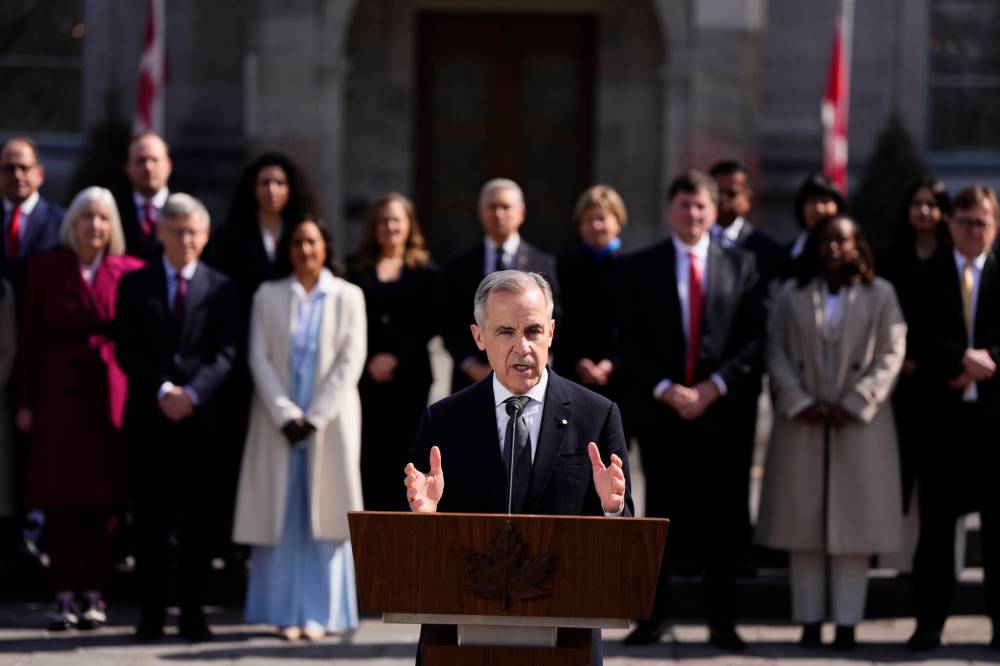Carney’s fine line between governing and campaigning
Advertisement
Read this article for free:
or
Already have an account? Log in here »
To continue reading, please subscribe:
Monthly Digital Subscription
$1 per week for 24 weeks*
- Enjoy unlimited reading on winnipegfreepress.com
- Read the E-Edition, our digital replica newspaper
- Access News Break, our award-winning app
- Play interactive puzzles
*Billed as $4.00 plus GST every four weeks. After 24 weeks, price increases to the regular rate of $19.00 plus GST every four weeks. Offer available to new and qualified returning subscribers only. Cancel any time.
Monthly Digital Subscription
$4.75/week*
- Enjoy unlimited reading on winnipegfreepress.com
- Read the E-Edition, our digital replica newspaper
- Access News Break, our award-winning app
- Play interactive puzzles
*Billed as $19 plus GST every four weeks. Cancel any time.
To continue reading, please subscribe:
Add Winnipeg Free Press access to your Brandon Sun subscription for only
$1 for the first 4 weeks*
*$1 will be added to your next bill. After your 4 weeks access is complete your rate will increase by $0.00 a X percent off the regular rate.
Read unlimited articles for free today:
or
Already have an account? Log in here »
Hey there, time traveller!
This article was published 14/03/2025 (190 days ago), so information in it may no longer be current.
Canada’s caretaker convention — the rules that govern how cabinet should behave during elections — will soon be put to the ultimate test.
The new Liberal leader, Mark Carney, was sworn in as Canada’s 24th prime minister Friday. While the former central banker is widely expected to call an election as early as next week, he will have to decide how big of a role he plans to play during the campaign in the trade war with the United States, and how he will respond to the continued attacks from U.S. President Donald Trump.
It won’t be an easy balancing act. Trump will surely try to insert himself into the federal election.

JUSTIN TANG / THE CANADIAN PRESS
The new Liberal leader, Mark Carney, was sworn in as Canada’s 24th prime minister Friday.
In Canadian politics, first ministers and members of cabinet remain in their positions during elections because someone still has to run government. Under the caretaker convention, cabinet is supposed to refrain from making major policy decisions during election campaigns. The rules are designed to prevent incumbents from using the power of office to tip the scales in their favour.
The question is: can Carney act as a “caretaker” prime minister by overseeing a government without the perception that he’s using the office to further his own agenda? That will not be easy to do if the events of the last few weeks are any indication.
The trade war between Canada and the U.S. shows no signs of easing, and with a fresh set of tariffs expected on April 2 — likely during an election campaign — Carney will have tough decisions to make.
On the one hand, he will be expected to avoid enacting major policies once the campaign begins (he’s free to make policy decisions until then). But on the other, he will have little choice but to respond during the campaign should Trump continue to hit Canada with more tariffs.
So, where is the line between making the necessary decisions to protect Canada during the writ period and refraining from using the office of the prime minister to further a partisan, political agenda?
That’s not an easy question to answer.
Both Carney and Conservative Leader Pierre Poilievre will try to convince Canadians they are best positioned to deal with Trump. Indeed, it will be the ballot box question in this election. Little else will matter.
It could work in Carney’s favour. If he’s forced to respond to additional U.S. tariffs by imposing more Canadian ones — or take other steps to protect the interests of Canada — it could demonstrate to voters in real time how effectively he can fight Trump. But how far is he allowed to go?
Since the current Liberal government has slapped the U.S. with retaliatory tariffs and announced it will impose more should Trump follow through with his plans for a 25 per cent tariff on all Canadian goods April 2, it would likely be acceptable under the caretaker convention for Carney to respond with more tariffs of his own.
But could he or his cabinet ministers go further by engaging in trade talks with U.S. officials or even meeting with Trump himself during the campaign? Could he approve financial aid packages to Canadian businesses and employees hard hit by the U.S. tariffs? Those actions, even if warranted, could be seen as violating the convention, especially if they result in the implementation of major policy.
At the same time, under the convention, cabinet is allowed to deal with “urgent” matters during a writ period. So there’s a lot of nuance.
These are uncharted waters. Former prime minister Justin Trudeau faced a similar challenge during the COVID-19 pandemic when he called an election in 2021 during a global public health crisis. He had to be careful not to make major policy decisions during the election while managing a pandemic. Some pandemic-related decisions had to be made, but they fell well within the parameters of the caretaker convention.
That distinction may not be as clear this time around.
Walking the razor-thin line between prudent governing during a trade war with Canada’s biggest economic partner, and adhering to the principles of the caretaker convention, will be no easy feat.
Being too reactive to Trump’s provocations could violate the rules. Yet, remaining too passive risks fuelling the narrative of a leader who isn’t up for the fight. The latter could be more politically damaging to Carney than the former.
Whatever the case, every political move and campaign announcement will be critical in an election that is now too close to call.
tom.brodbeck@freepress.mb.ca

Tom Brodbeck is an award-winning author and columnist with over 30 years experience in print media. He joined the Free Press in 2019. Born and raised in Montreal, Tom graduated from the University of Manitoba in 1993 with a Bachelor of Arts degree in economics and commerce. Read more about Tom.
Tom provides commentary and analysis on political and related issues at the municipal, provincial and federal level. His columns are built on research and coverage of local events. The Free Press’s editing team reviews Tom’s columns before they are posted online or published in print – part of the Free Press’s tradition, since 1872, of producing reliable independent journalism. Read more about Free Press’s history and mandate, and learn how our newsroom operates.
Our newsroom depends on a growing audience of readers to power our journalism. If you are not a paid reader, please consider becoming a subscriber.
Our newsroom depends on its audience of readers to power our journalism. Thank you for your support.












